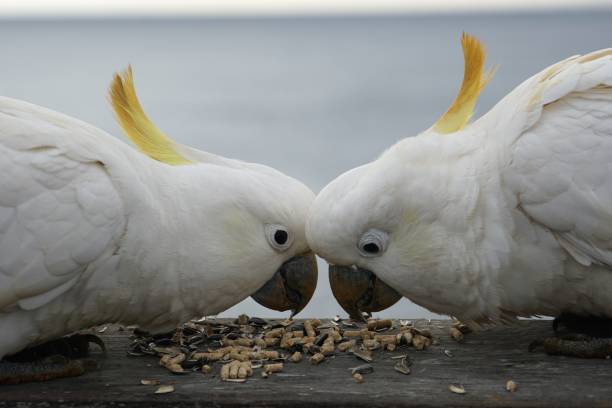If you’re a proud owner of a beautiful and intelligent cockatoo, you probably know that feeding them the right food is essential for their health and well-being.
A balanced and nutritious diet will keep your feathered friend healthy and happy for years to come. In this comprehensive guide, we’ll cover everything you need to know about cockatoo food, from the basics to the more advanced topics.

Understanding Cockatoo’s Nutritional Needs
Cockatoos are omnivorous birds, which means they need a diet that consists of both plant and animal matter. In the wild, they feed on a variety of fruits, seeds, nuts, insects, and small animals. When it comes to their diet in captivity, you should aim to replicate their natural diet as closely as possible.
A balanced cockatoo diet should include the following:
- Fresh fruits and vegetables: Offer a variety of fresh fruits and vegetables daily, such as apples, bananas, berries, broccoli, carrots, and leafy greens. These foods provide essential vitamins, minerals, and fiber that your bird needs to stay healthy.
- High-quality pelleted food: Pellets are a convenient and nutritionally balanced food source for cockatoos. Look for pellets that are free from artificial colors, flavors, and preservatives.
- Seeds and nuts: While seeds and nuts are an excellent source of protein and healthy fats, they should only be fed in moderation as they are high in fat. Aim to offer seeds and nuts as occasional treats rather than a staple food.
- Cooked or boiled grains and legumes: Cooked grains and legumes such as rice, quinoa, lentils, and beans are a great source of protein, fiber, and carbohydrates. Make sure to rinse them thoroughly before cooking to remove any dirt and debris.
What Foods to Avoid
Some foods can be harmful or toxic to cockatoos, and should be avoided at all times. These include:
- Avocado: Contains persin, a toxin that can be fatal to birds.
- Chocolate: Contains theobromine, a compound that is toxic to birds.
- Alcohol: Highly toxic to birds and can lead to respiratory failure and death.
- Caffeine: Can cause dehydration, hyperactivity, and cardiac arrest in birds.
Creating a Balanced Diet for Your Cockatoo
The key to providing a healthy diet for your cockatoo is variety. Aim to offer a wide range of foods from different food groups to ensure your bird is getting all the nutrients they need. Additionally, it’s important to offer fresh food daily and remove any uneaten food after a few hours to prevent spoilage.
Supplements for Cockatoos
In addition to a balanced diet, some cockatoos may benefit from dietary supplements. These can include:
- Calcium supplements: Cockatoos require a high amount of calcium in their diet to maintain healthy bones and feathers. Offer a calcium supplement in the form of cuttlebone or calcium powder.
- Vitamin supplements: Some cockatoos may benefit from additional vitamins, particularly vitamin A and D. Speak to your veterinarian before adding any supplements to your bird’s diet.
How Much to Feed Your Cockatoo
The amount of food your cockatoo needs will depend on their size, age, and activity level. As a general rule of thumb, offer a quarter to a half cup of pellets daily, along with fresh fruits and vegetables, seeds, and nuts as treats. Adjust the amount of food as needed based on your bird’s appetite and weight.